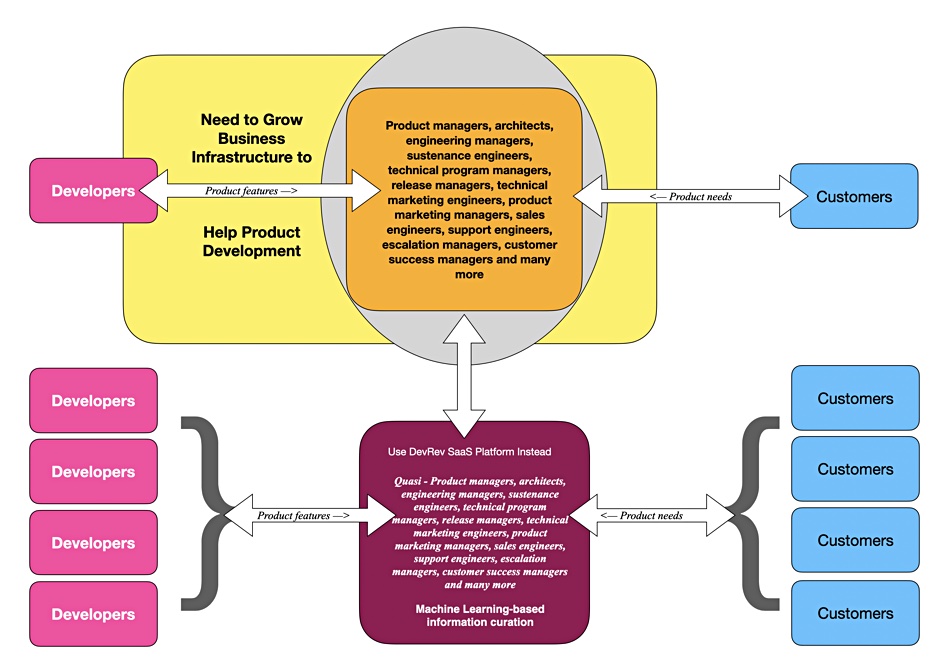Heading up a new firm that has just emerged from stealth, Nutanix’s co-founder and its former engineering VP are developing a ready-to-use SaaS platform which they say can provide comprehensive support for a growing startup business’s developer-to-customer product features.
The idea is that product developers will be able to grow their business by renting the business infrastructure needed to access customers, ship software product to them for testing and then use and get customer input on new feature needs and product supply and support issues. The developers will basically be renting business infrastructure from DevRev rather than needing to raise funding and spend on building their own.

That’s the promise of the dream laid out by Dheeraj Pandey, Nutanix co-founder and former CEO, and Manoj Agarwal, former Nutanix SVP of engineering, as their October 2020-founded company DevRev emerged from stealth with a near-record $50 million in seed funding.
A Pandey statement said: “Today, every company is a software company, yet we isolate developers (dev) from customers and revenue (rev). By removing the bureaucracy between makers and consumers — with APIs, design, and an opinionated engagement model — we will empower devs to create customer-conscious products and businesses. That’s our mission: bring dev and rev together.”
Siloed functions
Blocks & Files has read and studied the DevRev announcement release and three blogs by Agarwal to come up with this diagrammatic understanding of what DevRev is about:

As we understand it, product developers code a software product based on what they think potential customers need and ship it to test customers, gaining feedback, refining it, and finally GAing version 1. Then they grow their business with layers and layers of back office and front office-type bureaucracy with people carrying out siloed functions such as product managers, architects, engineering managers, and many, many more listed in the orange box in the diagram. The whole point of this infrastructure, the upper half of our diagram, is to find and qualify customers, ship product to them, support them and gain feedback on new features needed to guide development.
This is a massive outlay in terms of people, office and equipment costs. Imagine if you take all of it, scoop up the functionality and put it into a whole new piece of software that carries out these functions and puts developers in touch with customers far more quickly, effectively and with much, much lower cost through an API-driven SaaS platform that gathers and curates customer product feedback and makes it accessible to developers far faster than through the traditional business back-office product supply, support and development infrastructure.
The bottom half of the diagram represents this vision, this virtual back-office/front-office idea. The DevRev founders are hoping their platform can be used as a multi-user information exchange connecting many, many groups of customers to many, many different developers, and racking up massive recurring revenue fees. It can become, they are no doubt dreaming, the GitHub, the Salesforce, the ServiceNow of developers’ product-led customer relationship management.
Rent a virtual back/front-office
Developers won’t have to envisage going the Nutanix and Pure Storage route of blitz-led growth through enormous fund raises, huge cash burn rates, office real estate, HR-led people hiring and multi-year delays before profitability is reached. They just rent what they need from DevRev and scale their rented functionality as needed.
DevRev said its product (which may be better described as a service) will enable developers and customers to communicate and collaborate with each other socially and in real-time. By using the DevRev platform, developers will be able to connect their code to production issues and customer interactions in a “holistic” experience.
The big, big problem to be solved by DevRev is getting and curating customer feedback and presenting it in a useful way to developers. That’s where AI and machine learning come in and that is a huge problem and development focus for DevRev. Agarwal said of the issue: “Bringing AI/ML into the user experience raises a lot of questions. How much user data should we collect? How do we keep it secure? How do we monitor the progress of learning algorithms to avoid crossing boundaries of privacy?”
Stay tuned
DevRev has said it is a true post-pandemic company, being remote-first, not office-based, and maintaining purely digital operations, using social platforms to recruit talent, generate ideas, and build a community around its product.
Its platform will pull information from Salesforce and other CRM systems as well as social media, curate it, and make it accessible by developers.
DevRev has passed the 75+ employees already, presumably using founder and angel funding, and will recruit many more using the seed round funding. That came from Khosla Ventures, Mayfield Fund, LightSpeed Ventures, and individual contributors.
The initial DevRev product should GA in 2022.
Can Pandey and Agarwal pull this off? It is a tantalising idea and Pandey’s track record at building Nutanix and the team of execs there who have spread out to do other things — think Nutanix co-founders Mohit Aron at Cohesity and Ajeet Singh at ThoughtSpot, Poojan Kumar at Clumio — gets us thinking that, if anybody could, Pandey and Agarwal are a likely bet.








